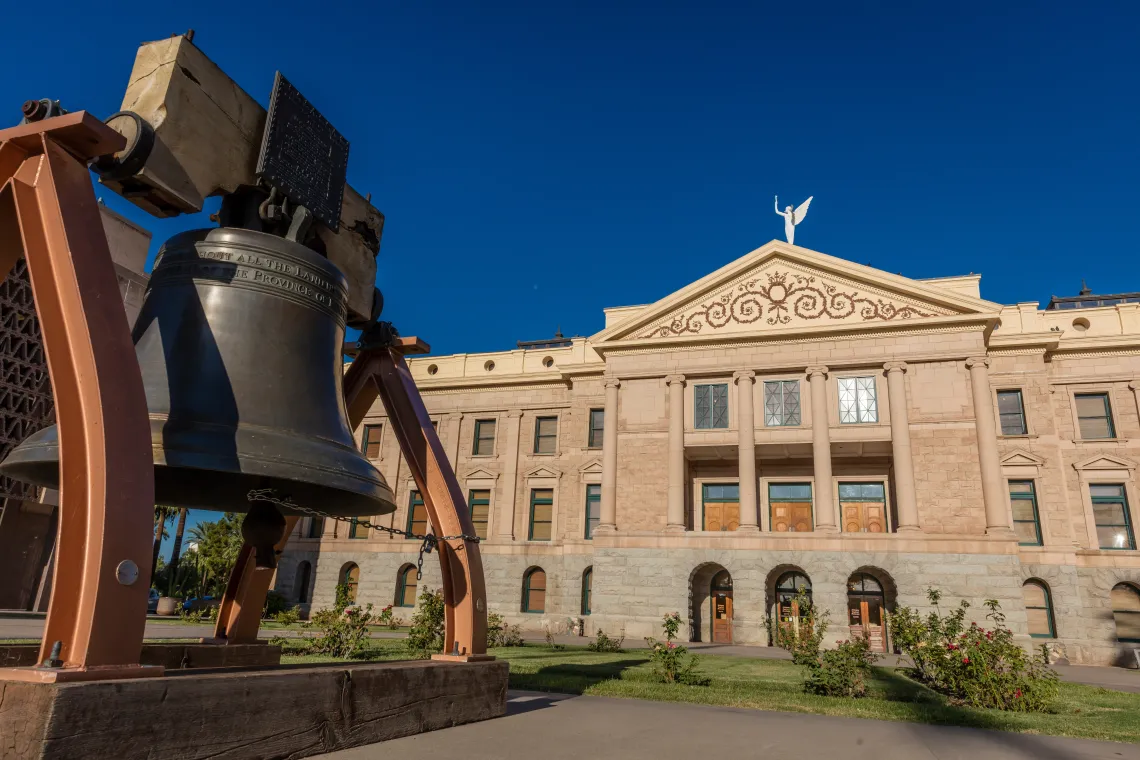UArizona Team Seeks to Bridge Science and Policy with State Fellowship Program

An interdisciplinary team of University of Arizona faculty and students is working to establish a science and technology policy fellowship, or STPF, program serving the Arizona Legislature.
“The program will enable postgraduate professionals to work with legislative research staff, serving as in-house nonpartisan experts available to address scientific and technical topics,” said Kevin Lansey, a professor of Civil and Architectural Engineering and Mechanics and the initiative’s Principal Investigator.
The team is supported by a 12-month planning grant that was awarded and administered by the National Conference of State Legislatures, or NCSL, with support from the Gordon and Betty Moore Foundation. The NCSL provides bipartisan policy research, training resources, and technical assistance to legislators and staff members of the United States’ 50 state legislatures and the District of Columbia.
About 10 U.S. states currently have ongoing STPF programs in place. The UArizona team is one of five teams selected in 2023 by NCSL to plan new STPF programs within their states.
“An Arizona STPF program will provide legislators with direct access to nonpartisan counsel on the most critical issues facing the state today,” explained Caitlyn Hall, a team member who leads the Future Earth Resilience minor program in UArizona’s W.A. Franke Honors College and is an assistant professor of practice in the university’s Department of Biosystems Engineering.
“This program will give decisionmakers options and information to best address Arizona communities’ challenges and values, including for issues such as water management, heat mitigation, transportation, industrial development,” Hall said.
During the planning grant period, the UArizona team aims to achieve three goals: determining program operation and integration within the Arizona Legislature, developing a process to select, retain, and educate fellows in science policy, and identifying funding sources to support the STPF program.
A key project activity is communication with legislators and their staffs to build confidence that fellows will serve their needs and develop the fellows’ administrative and reporting structures. This process is underway with Senators Shope and Sundareshan providing letters of support for the grant proposal. An advisory committee comprising faculty from Arizona’s three state universities as well as representatives of local communities, industries, and statewide organizations brings a range of perspectives of the needs and scope of an STPF in Arizona.
“Fellows participating in the program will gain unparalleled experience in science translation and the intersections of policymaking with science, industry, and public health,” in addition to supporting the legislature on scientific issues, said Sam Myers, a team member and doctoral candidate in UArizona’s Lunar and Planetary Laboratory.
State employees are prohibited from participating in partisan activities while on duty, so science policy fellows won’t make policy recommendations or decisions, Myers explained. “Science policy fellows will serve state legislators in a nonpartisan advisory capacity, providing options, information, and explanations to support the policymaking process.”
Selected fellows will receive training in science policy procedures and practices both prior to joining the program and throughout their tenure, Lansey said. “The STPF program is expected to attract and retain local scientific, engineering, and public health talent within Arizona. Since this program aims to engage universities, industry, and government stakeholders, we expect to foster collaboration that will lead to more public initiatives and knowledge transfer opportunities across sectors.”
The ultimate beneficiaries of a successful, ongoing STPF program will be Arizona residents, Lansey added: “We’ve seen great appreciation of science policy fellowship programs by lawmakers and residents in other states across the nation, and we hope through this initiative to provide Arizona with the same rewards.”
Current plans are to house and administer the STPF program under UArizona’s Science Policy and Diplomacy Initiative and the Arizona Institute for Resilience within the university’s Office of Research, Innovation, and Impact. For more information, contact azscipol@arizona.edu.

